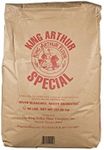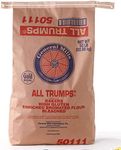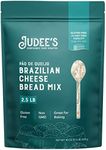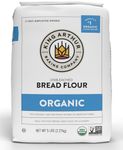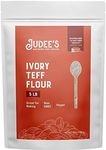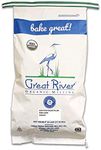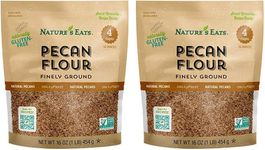Buying Guide for the Best Bread Flours
Choosing the right bread flour is essential for baking delicious and well-textured bread. The type of flour you select can significantly impact the taste, texture, and rise of your bread. Understanding the different types of bread flours and their key specifications will help you make an informed decision that suits your baking needs and preferences.Protein ContentProtein content in flour is crucial because it determines the gluten strength, which affects the bread's structure and chewiness. Higher protein content flours, like bread flour, typically range from 12-14% protein and are ideal for yeast breads that need a strong structure, such as baguettes and sourdough. Medium protein content flours, around 10-12%, are versatile and can be used for a variety of bread types, including sandwich loaves and rolls. Lower protein content flours, below 10%, are softer and better suited for tender baked goods like cakes and pastries. Choose a flour with higher protein content if you want a chewier, more structured bread, and a lower protein content for softer, more delicate bread.
Gluten StrengthGluten strength refers to the elasticity and extensibility of the dough, which is important for trapping gas produced by yeast and giving bread its rise and texture. Strong gluten flours are best for breads that require a lot of rise and structure, such as artisan loaves and pizza dough. Moderate gluten strength is suitable for everyday bread like sandwich loaves, while low gluten strength is ideal for softer, more tender breads. Consider the type of bread you want to bake and choose a flour with the appropriate gluten strength to achieve the desired texture and rise.
Ash ContentAsh content measures the mineral content in flour, which can affect the flavor and color of the bread. Higher ash content flours, often found in whole grain flours, have a more robust flavor and darker color, making them suitable for rustic and hearty breads. Lower ash content flours are lighter in color and have a milder flavor, ideal for white breads and delicate pastries. If you prefer a more flavorful and nutritious bread, opt for a flour with higher ash content. For a lighter, more refined bread, choose a flour with lower ash content.
Milling ProcessThe milling process can influence the texture and nutritional content of the flour. Stone-ground flours retain more of the grain's natural nutrients and have a coarser texture, which can add a rustic quality to your bread. Roller-milled flours are more refined and consistent, producing a smoother texture and lighter crumb. If you value nutrition and a hearty texture, stone-ground flour may be the right choice. For a more uniform and fine-textured bread, roller-milled flour is preferable.
EnrichmentEnriched flours have added vitamins and minerals, which can enhance the nutritional value of your bread. Common enrichments include iron, folic acid, and B vitamins. If you are looking to boost the nutritional profile of your bread, choosing an enriched flour can be beneficial. However, if you prefer a more natural product without added nutrients, opt for an unenriched flour.

